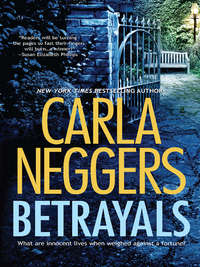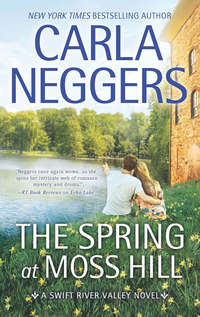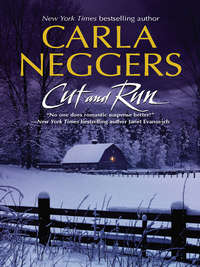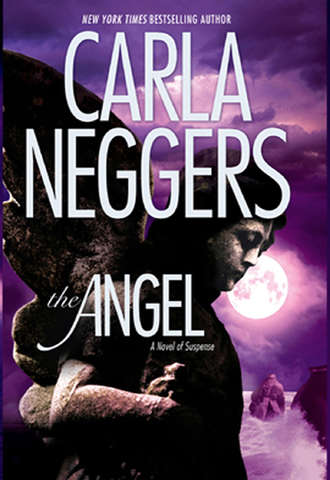
Полная версия
The Angel

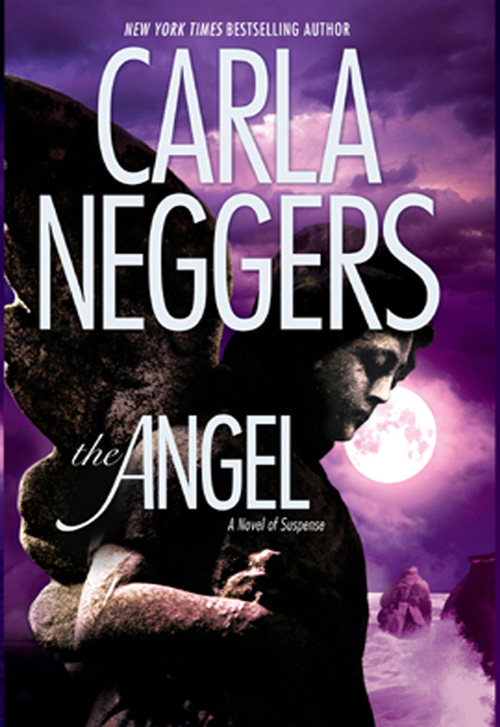
Praise for the novels of
CARLA NEGGERS
“No one does romantic suspense better!”
—Janet Evanovich
“A believable, gripping story that will keep armchair sleuths guessing… Here is intelligent writing that remains highly entertaining.”
—Publishers Weekly on Betrayals
“Neggers has created yet another well-matched pair of characters and given them a crackerjack mystery to solve—complete with a seriously creepy villain.”
—Romantic Times BOOKreviews on Abandon
“[Neggers’s] skill at creating colorful characters and deliciously twisted story lines makes this an addictive read.”
—Publishers Weekly on Stonebrook Cottage
“When it comes to romance, adventure and suspense, nobody delivers like Carla Neggers.”
—Jayne Ann Krentz
“A keen ear for dialogue and a sure hand with multidimensional characterizations are Neggers’s greatest gifts as a storyteller…. By turns creepy and amusing, the story engages on several levels.”
—Romantic Times BOOKreviews on Breakwater
“Neggers keeps the reader guessing ‘whodunit’ to the end of her intriguing novel.”
—Publishers Weekly on The Widow
“Suspense, romance and the rocky Maine coast—what more could a reader ask? The Harbor has it all. Carla Neggers writes a story so vivid you can smell the salt air and feel the mist on your skin.”
—Tess Gerritsen
The Angel
Carla Neggers

To Kate and Conor
ACKNOWLEDGMENTS
To Brendan Gunning for all the wonderful Irish and Irish-American stories, and to Myles Heffernan, Paul Hudson, Jamie Carr and Christine Wenger for sharing your knowledge and expertise.
To Sarah Gallick for the help with Irish saints and for sending me early excerpts from The Big Book of Women Saints.
To my daughter, Kate Jewell, and my son-in-law, Conor Hansen, for getting us all to southwest Ireland. Conor, I’ll never forget standing in the stone house where your great-grandfather was born, or meeting your cousins on the Beara Peninsula.
To Don Lucey for the insight into Irish music and all the great recommendations.
To my agent, Margaret Ruley, and to my editor, Margaret Marbury, for the unwavering patience and support, and to the rest of the fabulous team in New York and Toronto—Donna Hayes, Craig Swinwood, Loriana Sacilotto, Dianne Moggy, Katherine Orr, Marleah Stout, Heather Foy, Michelle Renaud, Stacy Widdrington, Margie Miller, Adam Wilson and everyone who makes MIRA Books such an incredible pleasure to work with.
And to Joe Jewell, my husband, for all the great times in Boston, “our” city, and to Zack Jewell, my son…yes, another trip to Ireland is in the works. Can’t wait!
Carla Neggers
P.O. Box 826
Quechee, VT 05059
www.carlaneggers.com
Contents
Prologue
Chapter 1
Chapter 2
Chapter 3
Chapter 4
Chapter 5
Chapter 6
Chapter 7
Chapter 8
Chapter 9
Chapter 10
Chapter 11
Chapter 12
Chapter 13
Chapter 14
Chapter 15
Chapter 16
Chapter 17
Chapter 18
Chapter 19
Chapter 20
Chapter 21
Chapter 22
Chapter 23
Chapter 24
Chapter 25
Chapter 26
Chapter 27
Chapter 28
Chapter 29
Chapter 30
Chapter 31
Chapter 32
Chapter 33
Chapter 34
Chapter 35
Chapter 36
Chapter 37
Chapter 38
Chapter 39
Chapter 40
Chapter 41
Chapter 42
Epilogue
Prologue
South Boston, Massachusetts
2:00 p.m., EDT
July 12, Thirty Years Ago
A scrap of yellow crime scene tape bobbed in the rising tide of Boston Harbor where the brutalized body of nineteen-year-old Deirdre McCarthy had washed ashore. Bob O’Reilly couldn’t take his eyes off it.
Neither could Patsy McCarthy, Deirdre’s mother, who stood next to him in the hot summer sun. Coming out here was her idea. Bob didn’t want to, but he didn’t know what else to do. He couldn’t let her go alone.
“Deirdre was an angel.”
“She was, Mrs. McCarthy. Deirdre was the best.”
Ninety degrees outside, and Patsy shivered in her pastel blue polyester sweater. She’d lost weight in the three weeks since Deirdre hadn’t come home after her shift as a nurse’s aide. At first the police had believed she was just another South Boston girl who’d gone wrong. Patsy kept at them. Not Deirdre.
She disappeared on the night of the summer solstice. The longest day of the year.
Appropriate, somehow, Bob thought.
Patsy’s eyes, as clear and as blue as the afternoon sky, lifted to the horizon, as if she were trying to see the island of her birth, as if Ireland could bring her the comfort and strength she needed to get through her ordeal. She’d left the southwest Irish coast forty years ago at the age of nine and hadn’t been back since. She loved to tell stories about her Irish childhood, how she was born in a one-room cottage with no plumbing, no central heat—not even an outhouse—and how she’d learned to bake her famous brown bread on an open fire.
Bob wondered how she’d tell this story. The story of her daughter’s kidnapping, rape, torture and murder.
The police hadn’t released details, but Bob, the son of a Boston cop, had heard rumors of unspeakable acts of violence and depravity. He was twenty and planned on becoming a detective, and one day he would have to wade through such details himself. He hoped the victim would never be someone he knew. He and Deirdre had learned to roller-skate together, had given each other their first kiss, just to see what it was like.
“I heard the cry of a banshee all last night,” Patsy said quietly. “I can’t say I do or don’t believe in fairies, but I heard what I heard. I knew we’d find Deirdre this morning.”
The fine hairs stood on the back of Bob’s neck. A retired firefighter walking his golden retriever at sunrise had come upon Deirdre’s body. The police had come and gone, working with a grim efficiency, given Boston’s skyrocketing homicide rate. Now they had another killer to hunt.
With the city behind them and the boats out on the water and planes taking off from Logan Airport, Bob still could hear the lapping of the tide on the sand. He’d never felt so damn helpless and alone.
“Deirdre Ita McCarthy.” Patsy crossed her arms on her chest as if she were cold. “It’s the name of an Irish saint, you know. Saint Ita was born Deirdre and took the name Ita when she made her vows. Ita means ‘thirsting for divine love.’”
Patsy was deeply religious, but Bob had stopped attending mass regularly when he was sixteen and his mother said it was up to him to go or not go. He knew he’d go back to church for Deirdre’s funeral.
“I’ve never been good at keeping track of the saints.” He tried to smile. “Even the Irish ones.”
“Saint Patrick, Saint Brigid and Saint Ita are early Celtic saints. Saint Ita had the gift of prophecy. Angels visited her throughout her life. Do you believe in angels, Bob?”
“I’ve never thought about it.”
“I do,” she whispered. “I believe in angels.”
It wouldn’t strike Patsy as particularly contradictory to say in one breath she’d heard a banshee—a solitary fairy—and in another that she believed in angels. If her beliefs brought her comfort, Bob didn’t care. He didn’t know what to tell her about banshees or angels or anything else. Her husband had died of a heart attack four years ago. Now this. “The police will find who took Deirdre from us.”
“No. They won’t. They can’t.” Patsy shifted her gaze back to the crime scene tape floating in the water. “The police are only human after all.”
“They won’t rest until they catch whoever did this.”
“It was the devil who took Deirdre. It wasn’t a man.”
“Doesn’t matter. If the police have to go to hell to find and arrest the devil, that’s what they’ll do. If I have to do it myself, I will.”
“No—no, Bob. Deirdre wouldn’t have you sacrifice your soul. She’s with her sister angels now. She’s at peace.”
Bob suddenly realized Patsy meant the devil literally. He pictured Deirdre with her blond hair and blue eyes, her translucent skin and innocent smile. She was as good as good ever was. She wouldn’t have stood a chance with someone who meant her harm. Devil or no devil.
He’d miss her. He’d miss her for as long as he lived.
He pushed back his emotions. It was something he’d need to learn to do if he was going to be a detective and catch people the likes of whoever had killed Deirdre.
“We don’t want this cretin to hurt someone else.”
“No, we don’t.” Patsy turned from the water. “But there are other ways to fight the devil.”
Two hours later, Bob found his sister, Eileen, reciting the rosary on a bench in the shade of a sprawling oak on the Boston College campus, where she had a summer work-study job at the library.
“I didn’t know you still had rosary beads,” he said.
“I didn’t, either. I found them in my jewelry box this morning.” She spoke in a near whisper as she held a single ivory-colored bead between her thumb and forefinger. “I haven’t said the rosary in ages. I thought I might not remember, but it came right back to me.”
Bob sat next to her. His sister was the smart one in the family. She’d returned two days ago from a summer study program in Dublin. No one had called to tell her Deirdre had gone missing. What could Eileen do from Ireland? Why spoil her time there, when they all hoped Deirdre would turn up, safe and sound?
When news of the discovery of Deirdre’s body reached the O’Reilly household that morning, Eileen pretended nothing had happened and left for work.
“I’ve just come from the waterfront with Mrs. McCarthy,” Bob said.
Eileen tensed, as if his words were a blow, and he didn’t go on. Her hair was more dirty blond than red like his, and she had more freckles. She’d never thought she was all that attractive, but she’d always been hard on herself—his sister had no limit to her personal list of faults big and small.
“There’s nothing the police can do now.” Eileen lifted her eyes from her rosary beads and shifted her gaze to her older brother. “Is there?”
“They can find Deirdre’s killer. They can stop him from killing again.”
“They can’t undo what happened.”
His sister’s left hand trembled, but her right hand, which held her rosary beads, was steady. Bob noticed how pale she was, as if she’d been sick. His smart, driven sister had so many plans for her life, but coming back home from Ireland to Deirdre’s disappearance had thrown Eileen right back into the world she was trying to exit.
And now Deirdre was dead.
Eileen’s fingers automatically moved to the next bead, and he saw her lips move as she silently recited the Hail, Mary.
He waited for her to finish the entire rosary and return her beads to their navy velvet pouch. She clutched it in her hand and leaned back against the bench.
They both watched a squirrel run up a maple tree.
Without looking at her brother, Eileen said, “I’m pregnant.”
Of all the things Bob had anticipated she might say when she’d finished praying, he hadn’t imagined that one. Their parents would be shocked. He was shocked. She didn’t have a boyfriend that he knew about.
He fought an urge to run away. Get out of Boston, away from the aftermath of Deirdre’s death, from what was to come with his sister. It all flashed in his mind—Patsy grieving next door, the police hunting for Deirdre’s killer, Eileen getting bigger, trying to figure out what to do with the baby.
The baby’s father. Who the hell was he?
Bob curled his hands into tight fists. He was young. He didn’t have to stay in Boston and deal with all these problems. He could go anywhere. He could be a detective in New York or Miami or Seattle.
Hawaii, he thought. He could move to Honolulu.
“How far along are you?” he asked.
“Not far. I haven’t had the test yet, but I know.”
“Eileen…” Bob looked at his younger sister, but she didn’t meet his eyes. “What happened in Ireland?”
But she jumped to her feet and walked quickly toward the ivy-covered building where she worked, and he didn’t follow her.
A week later, a series of calls into the Boston Police Department alerted them to a man who had just leaped from a boat into Boston Harbor.
He was in flames when he hit the water.
By the time a passing pleasure boat reached him, he was dead.
Within hours, the dead man was identified as Stuart Fuller, a twenty-four-year-old road worker who rented an attic apartment three blocks from the house where Deirdre McCarthy lived with her mother. Police discovered overwhelming evidence that tied him to Deirdre’s murder.
They had their devil.
The autopsy on Fuller determined that he’d drowned, but his burns would have killed him if he hadn’t gone into the water.
That evening, Bob found Patsy on her back porch with about twenty small angel figurines lined up on the top of the wide wooden railing. Despite the summer heat, she wore a pink polyester sweater, as if she expected never to be warm again.
“Deirdre collected angels,” Patsy said.
“I know. It made it easy to buy her presents.” Bob pointed at a colorful glass angel he’d found for her on a high school trip to Cape Cod. “I got her that one for her sixteenth birthday.”
“It’s beautiful, Bob.”
His throat tightened. “Mrs. McCarthy—”
“The police were here this morning. They told me about Stuart Fuller. They asked me if I knew him.”
“Did you?”
“Not that I recall. I suppose I could have seen him in the neighborhood.” She narrowed her eyes slightly. “At church, perhaps. The devil is always drawn to good.”
Bob watched her use a damp cloth to clean a delicate white porcelain angel holding a small Irish harp. It was one of the more valuable figurines in Deirdre’s collection and one of her favorites. She’d loved all kinds of angels—it didn’t matter if they were cheap, cheesy, expensive, ethnic. She used to tell Bob she wanted to buy a glass curio cabinet in which to display them.
“Patsy…do you know anything about Fuller’s death?”
She seemed not to hear him. “I have a story I want to tell you.”
Bob didn’t have the patience for one of her stories right now. “Which one?”
“One you’ve never heard before.” She held up the cleaned figurine to the light. “My grandfather first told it to me as a child in Ireland. Oh, he was a wonderful storyteller.”
“I’m sure he was, but—”
“It’s a story about three brothers who get into a battle with fairies over an ancient stone angel.” Patsy’s eyes sparked, and for a moment, she seemed almost happy. “It was one of Deirdre’s favorites.”
“Then it can’t be depressing. Deirdre didn’t like depressing stories.”
“She didn’t, did she? Come, Bob. I’ll make tea and heat up some brown bread for you. It’s my mother’s recipe. I made it fresh this morning. My father used to say my mother made the best brown bread in all of West Cork.”
Bob had no choice but to follow Patsy into her small kitchen and help her set out the tea and the warm, dense bread. How many times had he and Eileen and Deirdre sat here, listening to Patsy tell old Irish stories?
She joined him at the table, her cheeks flushed as she buttered a small piece of bread. “Once upon a time,” she said, laying on her Irish accent, “there were three brothers who lived on the southwest coast of Ireland—a farmer, a hermit monk and a ne’er-do-well, who was, of course, everyone’s favorite…”
Bob drank the tea, ate the bread and pushed back tears for the friend he’d lost as he listened to Patsy’s story.
Chapter 1
Near Mount Monadnock
Southern New Hampshire
4:00 p.m., EDT
June 17, Present Day
Keira Sullivan swiped at a mosquito and wondered if its Irish cousins would be as persistent. She’d find out soon enough, she thought as she walked along the trail to her mother’s cabin in the southern New Hampshire woods. She’d be on a plane to Ireland tomorrow night, off to the southwest Irish coast to research an old story of mischief, magic and an ancient stone angel.
In the meantime, she had to get this visit behind her and attend a reception tonight in Boston. But she couldn’t wait to be tucked in her rented Irish cottage, alone with her art supplies, her laptop, her camera and her walking shoes.
For the next six weeks, she’d be free to think, dream, draw, paint, explore and, perhaps, make peace with her past.
More accurately, with her mother’s past.
The cabin came into view, nestled on an evergreen-blanketed hill above a stream. Keira could hear the water tumbling over rocks and feel it cooling the humid late spring air. Birds twittered and fluttered nearby—chickadees, probably. Her mother would have given all the birds on her hillside names.
The mosquito followed Keira the last few yards up the path. It had found her at the dead-end dirt road where she’d left her car and stayed with her throughout the long trek through the woods. She was less than two hours from Boston, but she might as well have been on another planet as she sweated in the June heat, her blond hair coming out of its pins, her legs spattered with mud. She wished instead of shorts she’d worn long pants, in case her solo mosquito summoned reinforcements.
She stood on the flat, gray rock that served as a step to the cabin’s back entrance. Her mother had built the cabin herself, using local lumber, refusing help from family and friends. She’d hired out, reluctantly, only what she couldn’t manage on her own.
There was no central heat, no plumbing, no electricity. She had no telephone, no radio, no television—no mail delivery, even. And forget about a car.
On frigid New England winter nights, life had to get downright unbearable, if not dangerous, but Keira knew her mother would never complain. She had chosen the simple, rugged existence of a religious ascetic. No one had thrust it upon her.
Keira peered through the screen door, grateful that her mother’s stripped-down lifestyle didn’t prohibit the use of screens. The pesky mosquito could stay outside.
“Hello—it’s me, Mum. Keira.”
As if her mother had other children. As if she might have forgotten her only daughter’s name since chucking the outside world. Keira had last visited her mother several weeks ago but hadn’t stayed long. Then again, they hadn’t spent much time together in the past few years, never mind the past eighteen months when she’d first announced her intention to pursue this new commitment.
Her mother had always been religious, which Keira respected, but this, she thought as she swiped again at her mosquito—this isolated hermit’s life just wasn’t right.
“Keira!” her mother called, sounding cheerful. “Come in, come in. I’m here in the front room. Leave your shoes on the step, won’t you?”
Keira kicked off her hiking shoes and entered the kitchen—or what passed for one. It consisted of a few rustic cupboards and basic supplies that her mother had scavenged at yard sales for her austere life. Her priest had talked her into a gas-powered refrigerator. He was working on talking her into a gas-powered stove and basic plumbing—even just a single cold-water faucet—but she was resisting. Except for the coldest days, she said, she could manage to fetch her own water from the nearby spring.
Winning an argument with Eileen O’Reilly Sullivan had never been an easy task.
Keira crossed the rough pine-board floor into the cabin’s main living area. Her mother, dressed in a flowing top and elastic-waist pants, got up from a high stool at a big hunk of birch board set on trestles that served as her worktable. Her graying hair was blunt cut, reminding Keira of a nun, but although her mother had turned to a religious life, she’d taken no vows.
“It’s so good to see you, Keira.”
“You, too.” Keira meant it, but if she wanted to see her mother, she had to come out here—her mother wouldn’t come to her in Boston. “The place looks great. Nice and cozy.”
“It’s home.”
Her mother sat back on her work stool. Behind her, a picture window overlooked an evergreen-covered hillside that dropped down to a stream. Keira appreciated the view, but, as much as she needed solitude herself at times, she couldn’t imagine living out here.
A nearby hemlock swayed in a gust of wind, sending a warm breeze through the tiny cabin. Except for a wooden crucifix, the barn-board walls of the main room were unadorned. Besides the worktable and stool, the only other furnishings were an iron bed with a thin mattress, a rocking chair and a narrow chest of drawers. Not only was the small, efficient cast-iron woodstove the sole source of heat, it was also where her mother did any cooking. She chopped the wood for the stove herself.
The land on which the cabin was built was owned by a South Boston couple whose country home was through the woods, in the opposite direction of the path Keira had just used. She considered them complicit in her mother’s withdrawal from the world—from her own family. They’d let her choose the spot for her cabin and then stood back, neutral, until she’d finally moved in last summer.
A year out here, Keira thought. A year, and she looks as content as ever.
“It really is so good to see you, sweetheart,” her mother said quietly.
“I didn’t mean to interrupt your work.”
“Oh, don’t worry about that.”
A large sheet of inexpensive sketch paper was spread out on her worktable. Before retreating to the woods, she’d owned an art supply store in the southern New Hampshire town where she’d moved as a young widow with a small daughter. Over the years, she’d become adept at calligraphy and the tricky art of gilding, supplementing her income by restoring gilt picture frames and mirrors and creating elaborate wedding and birth announcements. Now she was applying her skills to the almost-forgotten art of producing an illuminated manuscript. The same couple who’d let her build on their land had found someone willing to pay her to illustrate an original manuscript of select Bible passages. Other than requesting an Irish Celtic sensibility and choosing the passages, the client left her alone.
It was painstaking work—deliberate, skilled, imaginative. She had her supplies at arm’s reach. Brushes, pens, inks, paints, calligraphy nibs, gilding tips, a gilding cushion, polishing cloths and burnishers.
“You’re working on your own Book of Kells,” Keira said with a smile.
Her mother shook her head. “The Book of Kells is a masterpiece. It’s been described as the work of angels. I’m a mere human.”
Another wind gust shook the trees outside on the hill. Storms were brewing, a cold front about to move in and blow out the humidity that had settled over New England during the past week. Keira wanted to get back to her car before the rain started.








